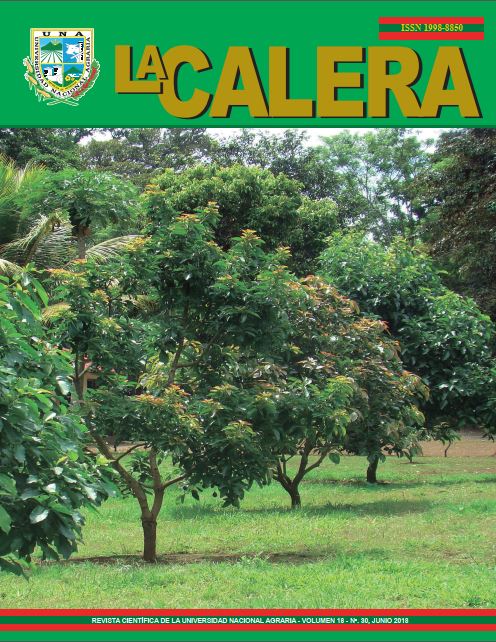Solid state fermentation of sugar cane and Moringa oleifera leaf meal for animal feeding
DOI:
https://doi.org/10.5377/calera.v18i30.7732Keywords:
raw protein, dry matter, neutral detergent fiber, digestibilityAbstract
Solid state fermentation (FES) of the mixture of shredded sugar cane and different levels (0, 5, 7.5 and 10% ) of Moringa oleifera leaf meal (HHMO) as protein source was studied in a completely randomized design, with four treatments and three replicates each one. During fermentative process, pH, environmental and fermentation temperature was recorded every four hours in each replicate by treatment during a 36 h period. Dry matter content (MS), Crude protein (PB), Neutral detergent fi ber (FDN) and In vitro digestibility of dry matter (DIVMS) were analyzed. No statistical signifi cance was observed for environmental temperature (28.85 0C ± 3.3), nor inclusion levels of HHMO over fermentation temperature (26.07 0C ± 1.94) nor pH of the fermentation product (5.75 ± 0.46). Signifi - cant increase of Crude protein content occurs (P<0.05) from 12.3 to 24.3% when inclusion of HHMO increased from 0% to 10% and no signifi cant diff erences exist between inclusion levels of 5% and 7.5% of HHMO with 20.8 and 21.4%, respectively. Inclusion of HHMO signifi cantly improves DIVMS even when no signifi cant diff erences were found in respect to FESCA with 0% of HHMO. It can be conclude that HHMO inclusion signifi cantly increase PB content and improves DIVMS on FES of sugar cane mixtures and 10% in the most adequate proportion of HHMO as additive to stimulate microbial growing and it protein content.
Downloads
1018
HTML (Español (España)) 731

